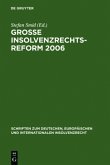As a central provision of the substantive insolvency law, § 103 of the InsO [Insolvency Statute] is of great practical importance. When an insolvency proceeding is opened, the insolvency administrator is often required to decide on the type of settlement for a number of mutual "provisional" contracts, meaning contracts not completely fulfilled by any party. This applies in particular for company insolvencies. In the past, the insolvency administrator's right of election was already a common subject matter of scholarly works. However, only the legal position within the insolvency proceeding stood at the center of these investigations. Therefore, the goal of the present work is the investigation of the legal position existing between the parties to the contract after the insolvency proceeding is cancelled either after complete final distribution or after an insolvency plan comes into effect.
The starting point is the fundamentally tense relationship between the contractual law of obligations and substantive insolvency law, and the associated question regarding the effects of the opening of the proceeding on the claims for fulfillment that are still open. The author presents the problems that arise with the application of the latest BGH [German Federal Supreme Court] judicature, according to which the opening of the proceeding affects only the "enforceability" of the claims for fulfillment, and offers solution recommendations. Particularly relevant in practice are the difficulties that result from the renunciation of the "forfeiture theory" when the insolvency reorganization plans go into effect.
Als zentrale Vorschrift des materiellen Insolvenzrechts ist
103 InsO von hoher praktischer Bedeutung. Bei Eröffnung eines Insolvenzverfahrens hat der Insolvenzverwalter häufig über die Art der Abwicklung einer Vielzahl von gegenseitigen "schwebenden", d.h. von keiner Partei vollständig erfüllten Verträgen zu entscheiden. Dies gilt insbesondere für Unternehmensinsolvenzen. Ausdrückliche Rechtsfolgen knüpft das Gesetz an die Wahlrechtsausübung nur hinsichtlich der verfahrensrechtlichen Stellung des Vertragspartners. Darüber hinaus schweigt das Gesetz allerdings über die Rechtsfolgen, die sich aus der Ausübung bzw. Nichtausübung des Wahlrechts nach
103 InsO ergeben. Das Wahlrecht des Insolvenzverwalters ist in der Vergangenheit schon häufig Gegenstand wissenschaftlicher Arbeiten gewesen. Im Mittelpunkt dieser Untersuchungen hat indes nur die Rechtslage innerhalb des Insolvenzverfahrens gestanden. Ziel der vorliegenden Arbeit ist deshalb die Untersuchung der zwischen den Vertragsparteien bestehenden Rechtslage, nachdem das Insolvenzverfahren entweder nach vollzogener Schlussverteilung oder nach Inkrafttreten eines Insolvenzplans aufgehoben worden ist. Ausgangspunkt ist das grundlegende Spannungsverhältnis zwischen vertraglichem Schuldrecht und materiellem Insolvenzrecht und die hiermit verbundene Frage nach den Auswirkungen der Verfahrenseröffnung auf die noch offenen Erfüllungsansprüche. Der Autor stellt die Probleme dar, die sich bei Anwendung der neuesten BGH-Judikatur, nach der die Verfahrenseröffnung nur die "Durchsetzbarkeit" der Erfüllungsansprüche beeinflusst, stellen, und bietet Lösungsvorschläge an. Praxisrelevant sind insbesondere die Schwierigkeiten, die durch die Abkehr von der "Erlöschenstheorie" bei Inkrafttreten von Sanierungsinsolvenzplänen entstehen.
The starting point is the fundamentally tense relationship between the contractual law of obligations and substantive insolvency law, and the associated question regarding the effects of the opening of the proceeding on the claims for fulfillment that are still open. The author presents the problems that arise with the application of the latest BGH [German Federal Supreme Court] judicature, according to which the opening of the proceeding affects only the "enforceability" of the claims for fulfillment, and offers solution recommendations. Particularly relevant in practice are the difficulties that result from the renunciation of the "forfeiture theory" when the insolvency reorganization plans go into effect.
Als zentrale Vorschrift des materiellen Insolvenzrechts ist
103 InsO von hoher praktischer Bedeutung. Bei Eröffnung eines Insolvenzverfahrens hat der Insolvenzverwalter häufig über die Art der Abwicklung einer Vielzahl von gegenseitigen "schwebenden", d.h. von keiner Partei vollständig erfüllten Verträgen zu entscheiden. Dies gilt insbesondere für Unternehmensinsolvenzen. Ausdrückliche Rechtsfolgen knüpft das Gesetz an die Wahlrechtsausübung nur hinsichtlich der verfahrensrechtlichen Stellung des Vertragspartners. Darüber hinaus schweigt das Gesetz allerdings über die Rechtsfolgen, die sich aus der Ausübung bzw. Nichtausübung des Wahlrechts nach
103 InsO ergeben. Das Wahlrecht des Insolvenzverwalters ist in der Vergangenheit schon häufig Gegenstand wissenschaftlicher Arbeiten gewesen. Im Mittelpunkt dieser Untersuchungen hat indes nur die Rechtslage innerhalb des Insolvenzverfahrens gestanden. Ziel der vorliegenden Arbeit ist deshalb die Untersuchung der zwischen den Vertragsparteien bestehenden Rechtslage, nachdem das Insolvenzverfahren entweder nach vollzogener Schlussverteilung oder nach Inkrafttreten eines Insolvenzplans aufgehoben worden ist. Ausgangspunkt ist das grundlegende Spannungsverhältnis zwischen vertraglichem Schuldrecht und materiellem Insolvenzrecht und die hiermit verbundene Frage nach den Auswirkungen der Verfahrenseröffnung auf die noch offenen Erfüllungsansprüche. Der Autor stellt die Probleme dar, die sich bei Anwendung der neuesten BGH-Judikatur, nach der die Verfahrenseröffnung nur die "Durchsetzbarkeit" der Erfüllungsansprüche beeinflusst, stellen, und bietet Lösungsvorschläge an. Praxisrelevant sind insbesondere die Schwierigkeiten, die durch die Abkehr von der "Erlöschenstheorie" bei Inkrafttreten von Sanierungsinsolvenzplänen entstehen.








